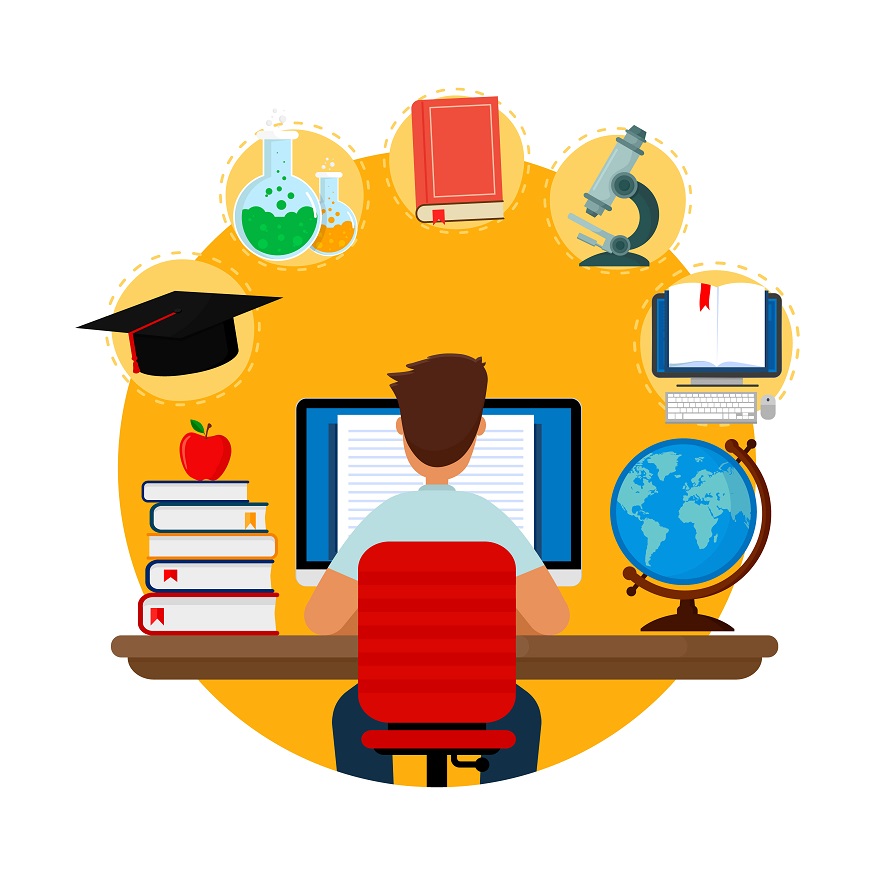When examining the realm of student life one cannot escape acknowledging the pivotal role played by the Internet – an expansive network that empowers individuals with unhindered access to information exchange, communication channels, and diverse online activities. Indeed, this unprecedented connectivity has irrevocably altered how we approach learning methodologies or engage with professional environments or interpersonal relationships. To foster a desired equilibrium between virtual engagement and other aspects of life; carefully monitoring and regulating students’ access to the Internet becomes important.
Also Read: Ways Parents Can Support Their Children’s Online Learning
Impact of Using Excessive Internet for Students:
Overuse of the Internet may divert students from their studies, resulting in poor performance in school and a drop in marks. It may hinder their ability to focus, complete assignments, and meet deadlines.
Students’ access to the Internet has become a normal thing in the digital lifestyle. But, spending excessive time online can disrupt students’ ability to manage their time effectively. It may be difficult for them to manage internet use with other essential responsibilities such as studying, participating in extracurricular activities, or maintaining a healthy lifestyle.
Uncontrollable internet access for all students can decrease productivity by diverting students’ attention away from important tasks. It can cause delay, a lack of motivation, and issues in focusing on academic or personal goals.
Excessive internet access for all students’ speech and internet use can lead to feeling lonely since kids may spend more time online and spend less time engaged in conversations with others. This affects their social skills, relationships, and overall health.
Spending too much time on the Internet can lead to an inactive lifestyle and physical health issues such as obesity, poor posture, and an increased risk for long-term illnesses. It may also interfere with sleep patterns, resulting in a lack of sleep and tiredness.
Internet addiction has been connected with mental health problems such as sadness, anxiety, and low confidence. Continuous social media contact, online bullying, and online battle can all have a negative impact on children’s mental health.
Excessive internet access for all students could limit children’s interaction with real-world experiences and possibilities for personal development. It can limit their ability to participate in outdoor activities, learn practical skills, or explore new interests outside of the digital environment.
Excessive internet use increases the danger of privacy incidents, online fraud, and cyberbullying. Students’ safety and security may be threatened if they mistakenly indicate personal information or participate in harmful online activities.
Also Read: Computer Education: Meaning, Evolution, Importance, Benefits
Importance of Setting Limits on Internet Usage for Students:
- Time Management:
- Improved Focus and Productivity:
- Healthy Lifestyle:
- Social Interaction:
- Digital Well-being:
- Creativity and Critical Thinking:
- Mental health:
- Academic Performance:
By setting limits on internet usage, students can develop effective time management skills.. They can set out time to study, complete homework, participate in extracurricular activities, and explore personal interests. This helps them maintain a balanced approach to their academic and personal lives.
Excessive internet use can be a significant distraction, leading to decreased focus and productivity. Setting limits allows students to minimise distractions, concentrate on their tasks, and work more efficiently. They can dedicate uninterrupted time to their studies, resulting in better learning outcomes.
Excessive screen usage can be hazardous to a student’s physical and mental health. Setting limits on internet usage encourages students to engage in physical activities, spend time outdoors, and pursue hobbies. It encourages a healthy lifestyle by decreasing activity levels and increasing overall health.
Excessive use of the Internet may block direct social relationships. This promotes improved interpersonal skills, emotional bonds, and a sense of belonging.
The Internet presents various online risks, such as cyberbullying, inappropriate content, and excessive social media use. Setting limits on internet usage ensures that students maintain a healthy digital footprint, protect their privacy, and navigate online spaces responsibly.
Setting limits on internet usage encourages students to explore other avenues for creativity and critical thinking. They can study books, explore hobbies, engage in creative efforts, or engage in problem-solving exercises. This improves their perspectives and develops their creative and analytical talents.
Excessive internet usage, particularly before night, may affect sleep patterns and lead to mental health problems such as depression and anxiety. Having limitations helps kids in developing appropriate sleep behaviours, allowing for enough rest and improved mental health.
Effective limits on internet usage positively impact students’ academic performance. Reduced distractions, enhanced attention, and better time management can help students to improve their learning, absorb knowledge more efficiently, and improve their overall scores and achievements.
Also Read: The Role of Technology in Education – Advantages and Disadvantages
Students without access to technology:
Here are some key points about the life of students without access to technology.
- Limited Information Access:
- Reduced Connectivity:
- Offline Learning Opportunities:
- Enhanced Critical Thinking:
- Creative Exploration:
- Direct Interactions:
- Offline Hobbies and Physical Activities:
- Digital Detox and Well-being:
- Reduced Distractions and Improved Focus:
Without internet access, students may face difficulties in accessing vast amounts of information readily available online. They may need to rely on traditional sources such as books, libraries, and offline resources for their research and learning needs.
The Internet allows students to connect with peers, educators, and resources globally. Without access, students may experience a limited network and miss out on opportunities for collaboration, online discussions, and knowledge-sharing platforms.
Without constant internet distractions, students can focus on offline learning activities. They can engage in deep reading, explore physical libraries, conduct direct experiments, and engage in direct discussions and arguments.
Without the instant availability of online information, students must develop critical thinking skills to analyse, synthesise, and evaluate information from alternative sources. This promotes independent thought and the ability to form well-rounded perspectives.
The absence of the Internet can inspire students to explore their creativity through artistic pursuits, hands-on projects, and imaginative play. They can rely on their own ideas and resources, fostering originality and self-expression.
Without the online realm, students can focus more on building face-to-face relationships and communication skills.. They can engage in meaningful conversations, develop empathy, and practise active listening.
Internet-free time allows students to discover and pursue offline hobbies such as sports, arts, music, and outdoor activities. Engaging in physical activities promotes fitness, well-being, and a balanced lifestyle.
A break from the Internet can provide students with an opportunity for a digital detox. It allows them to prioritise their mental health, reduce screen time, and find balance in their lives.
Without internet access, students may experience fewer distractions, allowing them to concentrate better on their studies, projects, and tasks at hand.
Also Read: Impact of Technology on Kids/Children
Conclusion:
At EuroSchool, we understand the great tools that the Internet provides and the importance of internet access for all students’ speech, but we also highlight the significance of setting limits and boundaries fo r kids to prevent the negative impacts of excessive usage. Students may have satisfying lives, achieve educational goals, build strong connections with others, and focus on their physical and emotional well-being by finding a balance between online and offline activities. Enrol your child with us where we ensure the overall development of a child is taken care of and little aspects which affect a student’s life are looked into. Check out our school admission process and connect with us for any questions about our schools!











